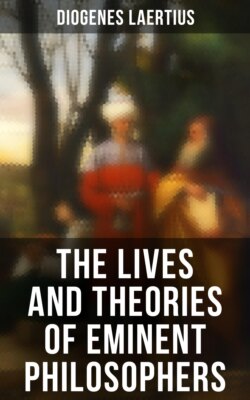Читать книгу The Lives and Theories of Eminent Philosophers - Diogenes Laertius - Страница 17
На сайте Литреса книга снята с продажи.
LIFE OF CHILO.
ОглавлениеTable of Contents
I. Chilo was a Lacedæmonian, the son of Damagetus. He composed verses in elegiac metre to the number of two hundred: and it was a saying of his that a foresight of future events, such as could be arrived at by consideration was the virtue of a man. He also said once to his brother, who was indignant at not being an ephor, while he himself was one, “The reason is because I know how to bear injustice; but you do not.” And he was made ephor in the fifty-fifth Olympiad; but Pamphila says that it was in the fifty-sixth. And he was made first ephor in the year of the archonship of Euthydemus, as we are told by Sosicrates. Chilo was also the first person who introduced the custom of joining the ephors to the kings as their counsellors: though Satyrus attributes this institution to Lycurgus. He, as Herodotus says in his first book, when Hippocrates was sacrificing at Olympia, and the cauldrons began to boil of their own accord, advised him either to marry, or, if he were married already, to discard his wife, and disown his children.
II. They tell a story, also, of his having asked Æsop what Jupiter was doing, and that Æsop replied, “He is lowering what is high, and exalting what is low.” Being asked in what educated men differed from those who were illiterate, he said, “In good hopes.” Having had the question put to him, What was difficult, he said, “To be silent about secrets; to make good use of one’s leisure, and to be able to submit to injustice.” And besides these three things he added further, “To rule one’s tongue, especially at a banquet, and not to speak ill of one’s neighbours; for if one does so one is sure to hear what one will not like.” He advised, moreover, “To threaten no one; for that is a womanly trick. To be more prompt to go to one’s friends in adversity than in prosperity. To make but a moderate display at one’s marriage. Not to speak evil of the dead. To honour old age.—To keep a watch upon one’s self.—To prefer punishment to disgraceful gain; for the one is painful but once, but the other for one’s whole life.—Not to laugh at a person in misfortune.—If one is strong to be also merciful, so that one’s neighbours may respect one rather than fear one.—To learn how to regulate one’s own house well.—Not to let one’s tongue outrun one’s sense.—To restrain anger.—Not to dislike divination.—Not to desire what is impossible.—Not to make too much haste on one’s road.—When speaking not to gesticulate with the hand; for that is like a madman.—To obey the laws.—To love quiet.”
And of all his songs this one was the most approved:—
